Understanding Medication Management in Complex Adult Cases
Medication management services are vital for adults, especially those navigating multiple health diagnoses. As the landscape of healthcare becomes increasingly intricate, understanding how these services support patients' safety, adherence, and overall health outcomes is essential. This article explores the core components of medication management, its accessibility, provider roles, and how it underpins recovery in individuals with co-occurring conditions.
What Are Medication Management Services and Their Core Components
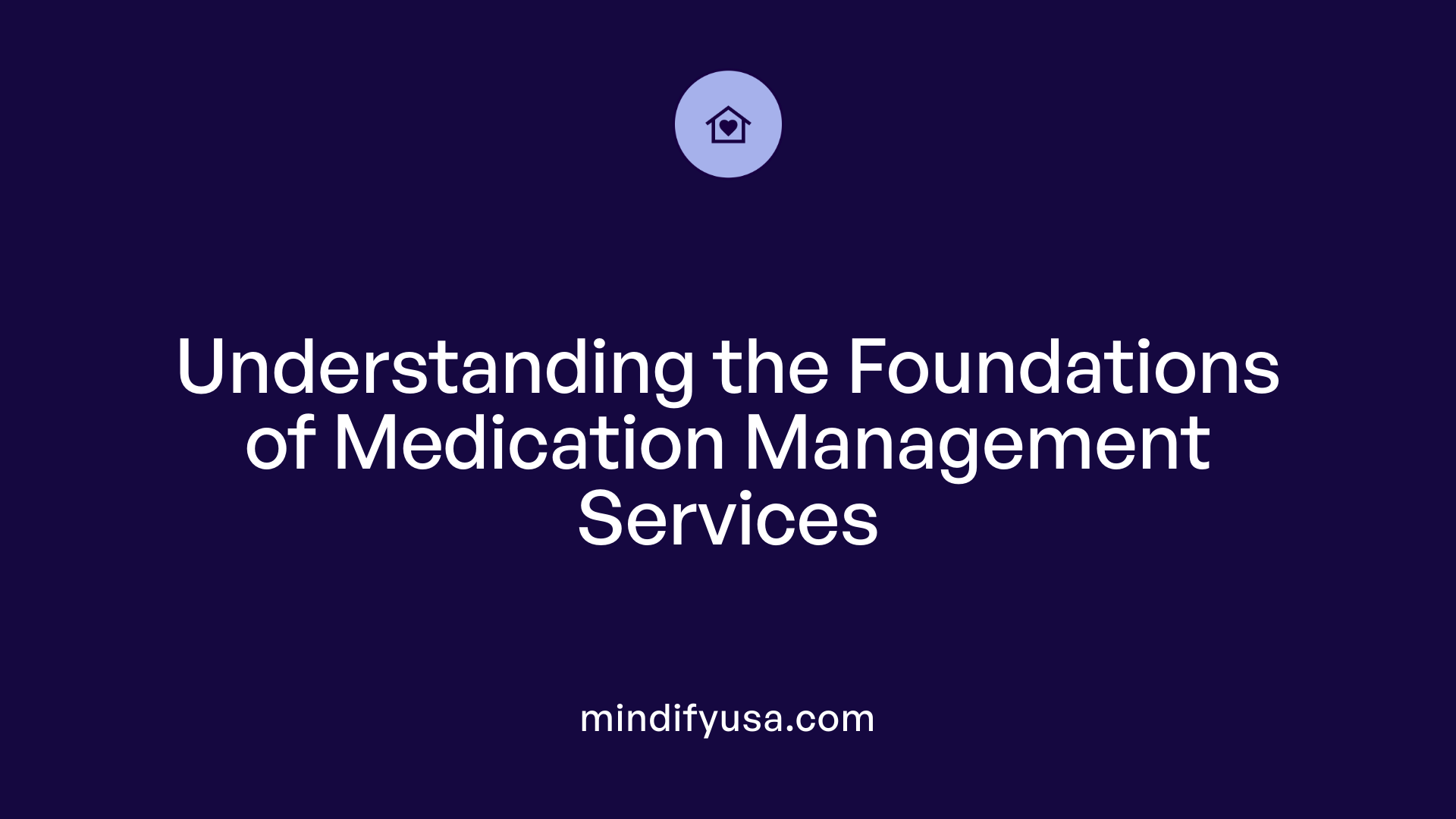 Medication management services (MMS) are specialized healthcare services designed to optimize the use of medications and support better health outcomes for individuals. These services often include Medication Therapy Management (MTM) and Comprehensive Medication Management (CMM), which are mainly provided by trained healthcare professionals such as pharmacists, nurse practitioners, or psychiatrists.
Medication management services (MMS) are specialized healthcare services designed to optimize the use of medications and support better health outcomes for individuals. These services often include Medication Therapy Management (MTM) and Comprehensive Medication Management (CMM), which are mainly provided by trained healthcare professionals such as pharmacists, nurse practitioners, or psychiatrists.
The primary aim of MMS is to ensure patients use their medications safely and effectively. To achieve this, services typically involve several core components. First, medication reviews are conducted to assess all current medications, including prescriptions, over-the-counter drugs, and supplements. Patients’ medication histories are compiled into personal medication records, which serve as a basis for ongoing care.
Creating medication-related action plans is another key element. These plans outline necessary adjustments, adherence strategies, or lifestyle recommendations to improve treatment. Healthcare providers may intervene or refer patients to other specialists if issues such as side effects or medication conflicts arise.
Monitoring plays a vital role in MMS. Regular follow-up appointments help evaluate the effectiveness of treatment, check for adverse reactions, and ensure adherence. Accurate documentation throughout this process supports continuity of care.
Overall, MMS prioritizes individualized care, tailoring medication plans to each patient’s unique health conditions and circumstances. Its goal is to ensure medications are used safely, reduce risks associated with polypharmacy, and enhance patient engagement and satisfaction. This collaborative approach helps prevent medication errors and promotes optimal management of complex health conditions, including mental health disorders, substance use issues, and chronic pain.
Accessibility and Challenges in Medication Management for Adults with Complex Conditions
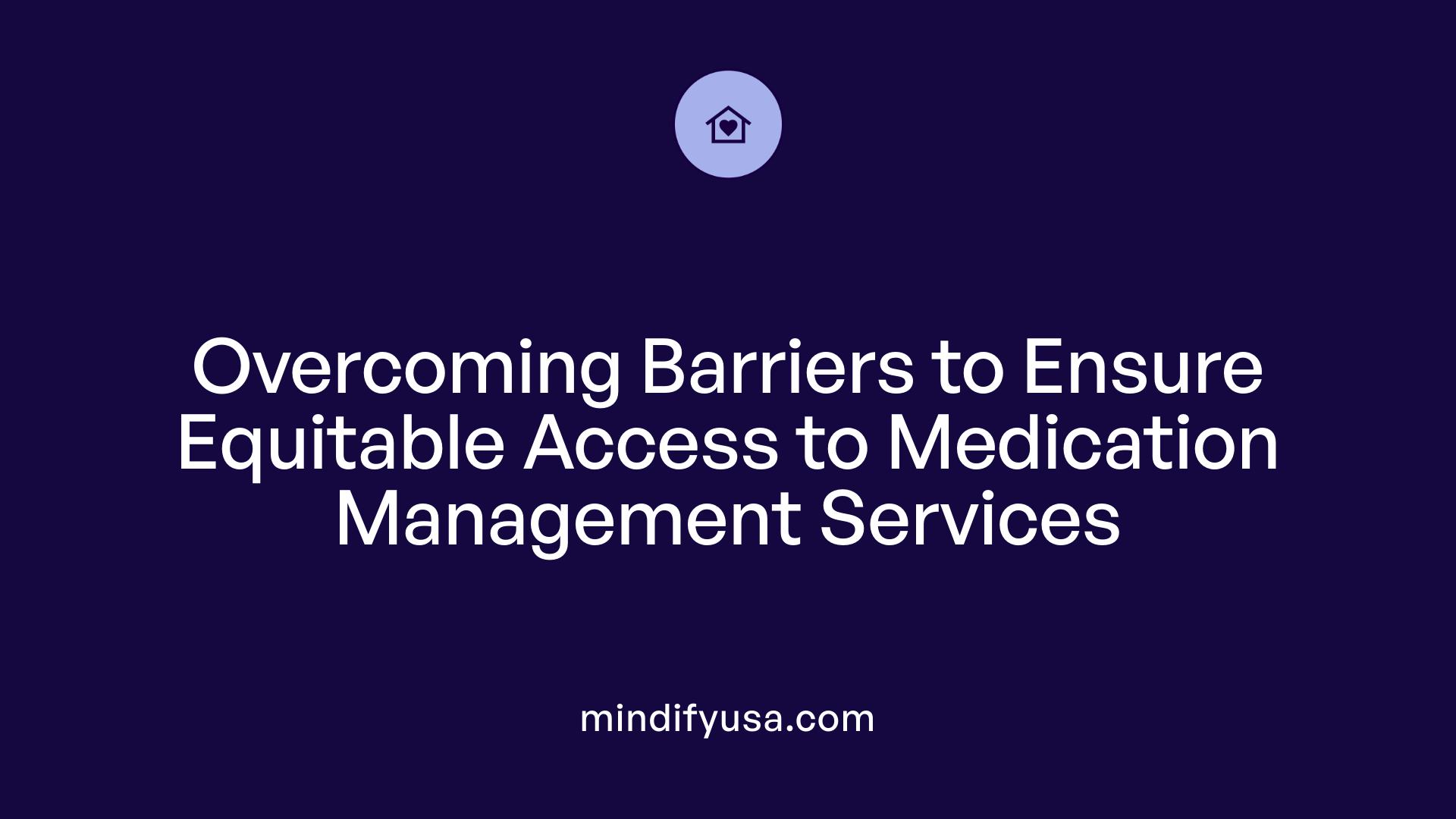
How accessible are medication management services for adults with complex health conditions?
Access to medication management services for adults dealing with multiple or intricate health issues varies significantly across different healthcare settings and individual circumstances. Healthcare providers, including clinics specializing in behavioral health, pharmacists, and multidisciplinary teams, generally strive to deliver comprehensive coverage that encompasses medication reviews, reconciliation, patient education, and continuous monitoring. These services are tailored to meet individual needs by conducting thorough physical and mental health assessments, customizing treatment plans, and closely monitoring medication responses to ensure safety and effectiveness.
However, several barriers can limit access to these essential services. Factors such as high costs, inadequate insurance coverage, transportation difficulties, and low health literacy can impede patients from receiving optimal care. Some adults might struggle to understand medication instructions or navigate complex healthcare systems, which can affect adherence and outcomes.
Efforts to improve access are ongoing. Healthcare providers work to address disparities through community outreach, sliding scale fees, telehealth options, and patient education initiatives. Despite these efforts, access remains inconsistent and heavily reliant on individual circumstances—including socioeconomic status, geographic location, and available healthcare infrastructure.
Ultimately, while many adults with complex health needs can access medication management services, the degree of availability and quality of care often depends on social determinants and the level of support within the healthcare system. Continued focus on reducing disparities and expanding comprehensive services is essential to ensure all adults can safely and effectively manage their medications.
The Role of Medication Management for Adults with Multiple Diagnoses
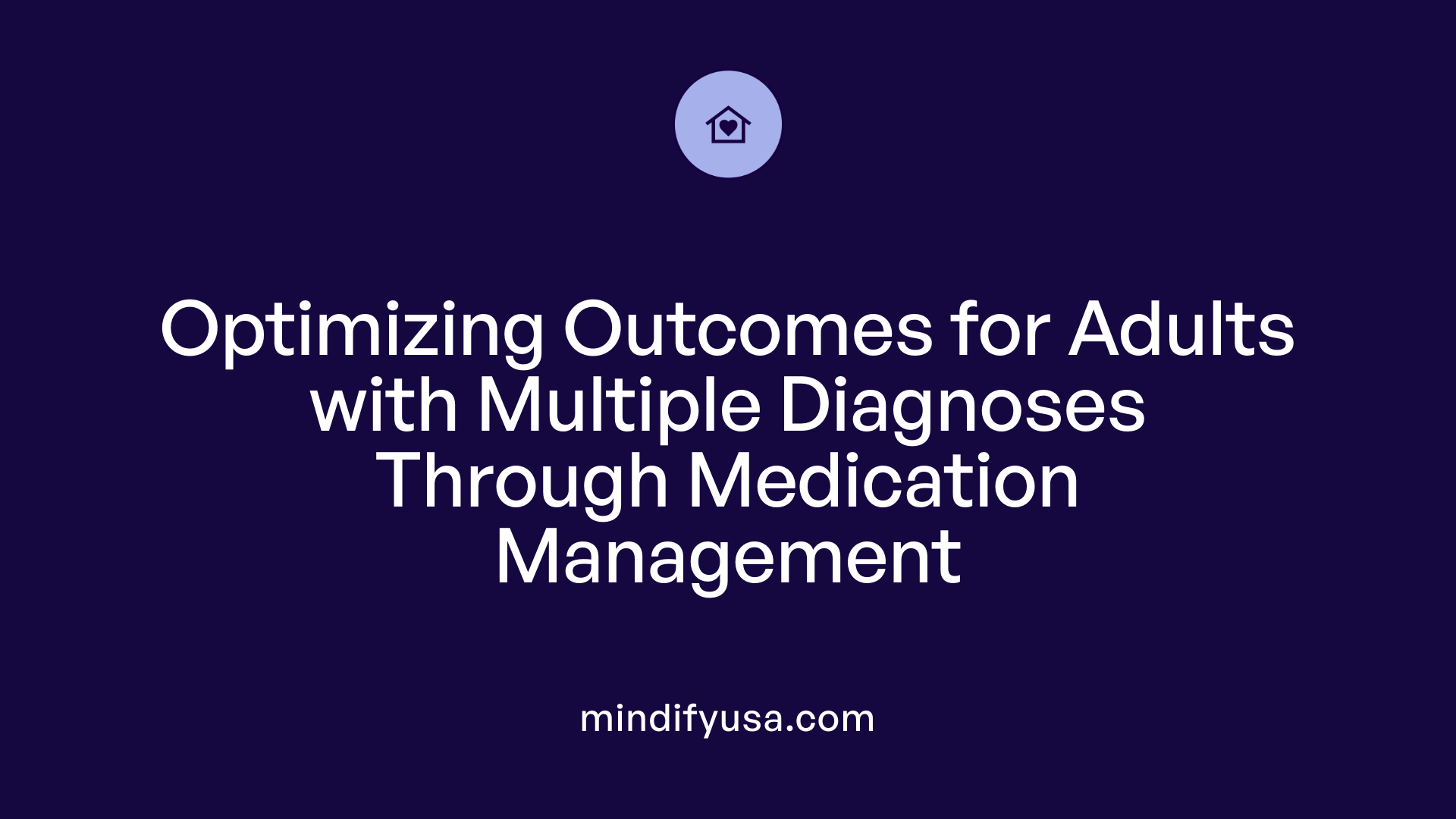
What role does medication management play for adults with multiple health diagnoses?
In cases where adults face several mental and behavioral health conditions, medication management becomes vital for delivering effective, coordinated care. It involves much more than simply prescribing medications; clinicians review the patient's overall health, medication history, and current treatments to create a comprehensive plan. This process helps reduce the risk of drug interactions that could worsen symptoms or cause adverse effects.
Professionals such as nurse practitioners, psychiatrists, and therapists continuously monitor how medications influence mental health, making adjustments as needed. Regular follow-up appointments ensure that treatments remain appropriate and effective, especially for patients with complex needs like bipolar disorder, depression, anxiety, or substance use issues.
Supporting patients through personalized medication strategies helps relieve symptoms more efficiently. It facilitates a holistic approach where medication work hand-in-hand with therapies like counseling, psychoeducation, or support groups. This approach aims to stabilize mental health, improve daily functioning, and foster overall well-being.
Furthermore, managing medications carefully addresses emotional and social challenges that come with mental health treatments. It promotes open communication and shared decision-making, making patients active participants in their care. By tailoring treatments, providers help reduce stigma and empower individuals to manage their health confidently.
In summary, medication management for adults with multiple diagnoses enhances safety, ensures treatment continuity, and improves health outcomes, making it an essential component of comprehensive behavioral health services.
Benefits of Medication Management for Co-occurring Conditions
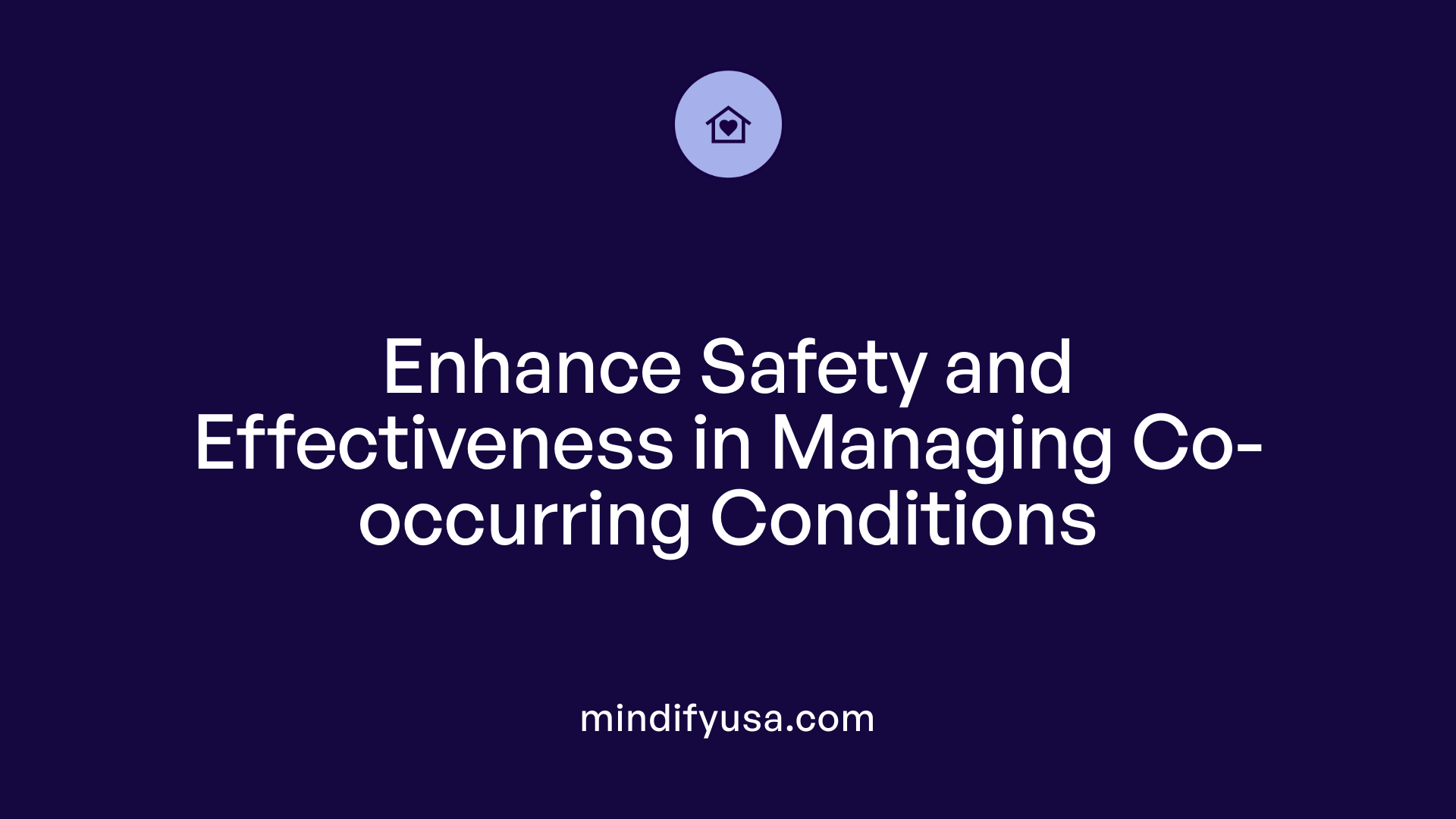
How do medication management services benefit individuals with co-occurring mental and physical health conditions?
Medication management plays a vital role for adults facing both mental health challenges and physical health issues. These services ensure that medications are safe, effective, and tailored to each person's unique needs. Regular check-ins allow healthcare providers to monitor treatment responses, make necessary adjustments, and minimize side effects.
One major advantage is the prevention of harmful drug interactions. Patients with multiple diagnoses often take various medications, which increases the risk of adverse reactions. Medication management helps identify and mitigate these risks, helping improve overall health outcomes.
In addition, these services promote better adherence to prescribed regimens. Providers educate patients about their medications, address concerns, and help establish routines, reducing the chances of missing doses or stopping treatment prematurely. When patients follow their medication plans, symptoms tend to be better controlled, and recovery is faster.
Medication management also works best when combined with behavioral therapies and support systems. This integrated approach fosters stability, improves quality of life, and reduces relapse. It helps patients manage symptoms effectively across mental and physical health, thus supporting comprehensive recovery.
Furthermore, consistent medication review and adjustment foster healthier long-term management of complex conditions. By addressing both mental health and physical health needs simultaneously, medication management enhances treatment efficacy, reduces hospitalization rates, and promotes sustained well-being.
| Aspect | Explanation | Additional Detail |
|---|---|---|
| Increased safety and efficacy | Proper drug selection and dosing | Ensures medications work well without harmful effects |
| Prevention of errors | Regular monitoring and review | Detects issues early and adjusts treatments |
| Support for adherence | Education and follow-up | Encourages consistent medication use |
| Integrated care | Combination with therapy | Promotes holistic recovery |
Overall, medication management services are crucial for adults with complex health profiles, improving health outcomes and supporting long-term stability across multiple conditions.
Provision and Execution of Medication Management Services: Roles of Healthcare Providers
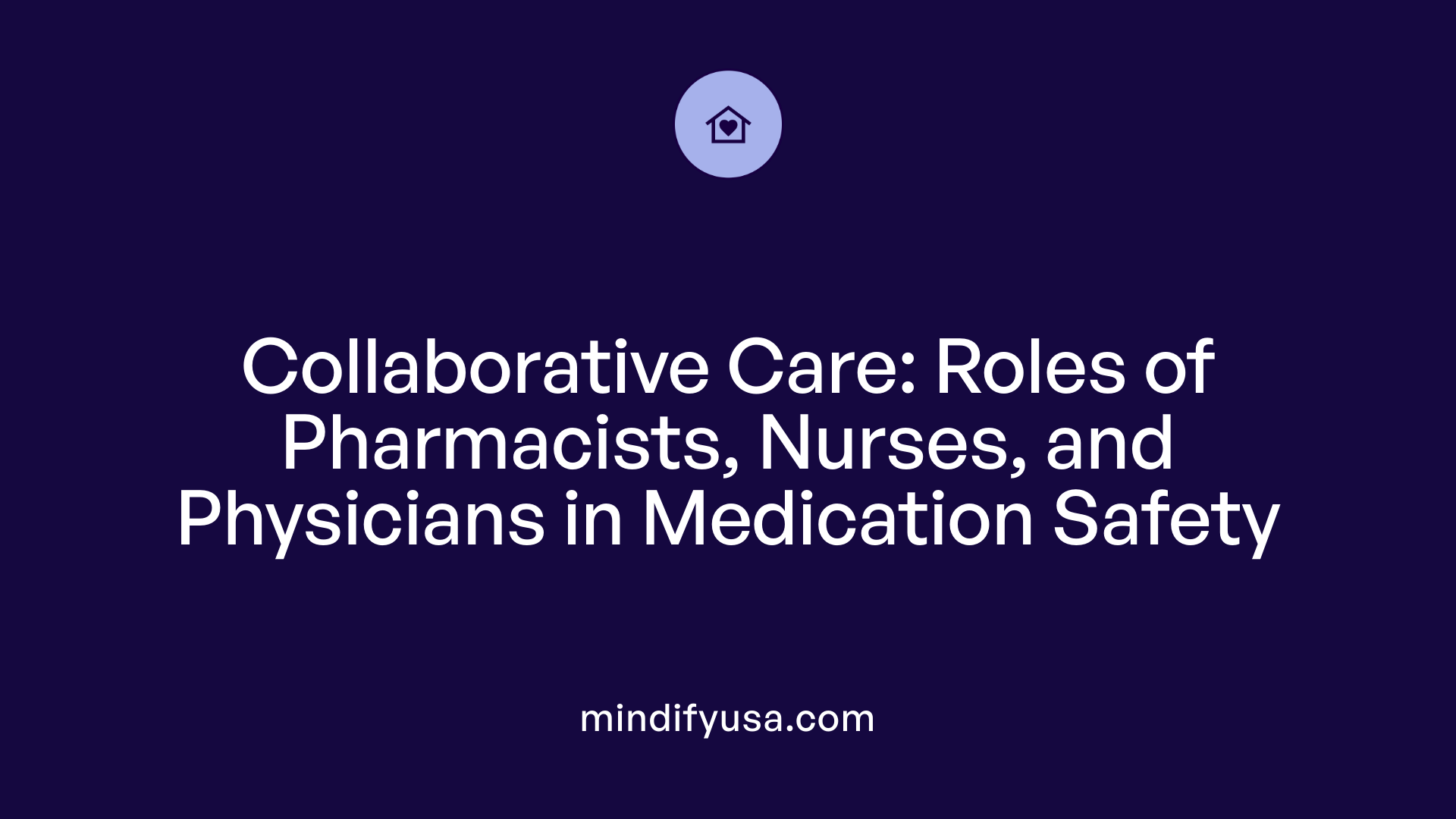 Medication management services are essential in ensuring patients receive safe, effective, and personalized care for their mental health conditions. These services are delivered through a combination of thorough assessments, medication reviews, counseling, and continuous monitoring, involving a multidisciplinary team of healthcare providers such as pharmacists, physicians, and nurses.
Medication management services are essential in ensuring patients receive safe, effective, and personalized care for their mental health conditions. These services are delivered through a combination of thorough assessments, medication reviews, counseling, and continuous monitoring, involving a multidisciplinary team of healthcare providers such as pharmacists, physicians, and nurses.
Pharmacists are often at the forefront of medication therapy management (MTM). They develop individualized medication plans tailored to each patient's diagnoses and medical history. Pharmacists also play a crucial role in educating patients and caregivers about proper medication use, potential side effects, and adherence strategies. Their expertise helps prevent common issues like medication errors, non-adherence, and adverse reactions.
Technology significantly enhances medication safety. Barcode scanning ensures the right medication is administered to the right patient at the correct dose. Clinical decision support systems help providers review potential drug interactions and contraindications. These tools assist in maintaining high safety standards and reducing human errors.
Nurses contribute directly in verifying medication orders, confirming patient identity, and administering medications according to established protocols such as the 'five rights'—right patient, right drug, right dose, right route, and right time. They monitor patients for any immediate adverse reactions and provide feedback to the team about the patient’s response.
Coordination among healthcare providers is vital for safe medication use. Physicians review and prescribe medications based on comprehensive evaluations. Pharmacists and nurses collaborate to verify prescriptions, prepare medications, and monitor ongoing responses. Regular communication ensures adjustments can be made promptly, optimizing therapeutic outcomes.
Ultimately, the combined effort of these professionals forms a seamless system aimed at maximizing treatment benefits while minimizing risks. This integrated approach supports patients in managing complex conditions and achieving better overall mental health and well-being.
Summary of Provider Roles in Medication Management:
| Provider Type | Main Responsibilities | Tools/Methods Used | Focus Area |
|---|---|---|---|
| Pharmacists | Develop plans, educate | MTM, patient counseling, safety tech | Medication plans, education, safety |
| Physicians | Prescribe, evaluate | Clinical assessments, medical history reviews | Diagnosis, treatment oversight |
| Nurses | Verify, administer | Protocol adherence, patient monitoring | Safe administration, patient observation |
Empowering Patients Through Knowledge and Tailored Care
Effective medication management is a cornerstone of comprehensive adult healthcare, especially for those with multiple diagnoses. Its core components—rigorous assessment, personalized treatment plans, ongoing monitoring, and interprofessional collaboration—are designed to optimize safety, efficacy, and patient engagement. Access remains a challenge, but efforts are ongoing to improve availability and address disparities. By integrating medication management with therapy, education, and behavioral health services, providers can significantly enhance recovery and long-term health outcomes. Educating patients about their medication options and ensuring personalized, continual care empowers individuals to manage their health confidently, ultimately fostering a resilient path to wellness.
References
- Adult Services | dmh - Department of Behavioral Health
- Medication Management Services
- Medication Management
- Adult Medication Management in Maryland
- Behavioral Health Services in Washington DC, Baltimore ...
- Medication Management | Dual Diagnosis Treatment
- Psychiatry & Medication Management
- Medication management in the context of mental illness
- How Medication Management Supports Mental Health ...
- The Importance of Medication Management for Mental Health





































































































